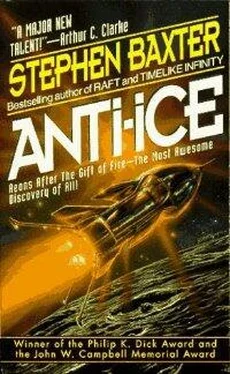The Shelling marked the end of the European war, of course; if a new fear of British intervention were not sufficient, I believe the will to fight of those men who had been gathered on the plains of the Loire was expunged by their salvage work amid the stink of Orléans. I remember watching the Prussian columns form up, filthy, slow and solemn, to make for home; and I knew then that here was one generation for whom war was done.
Edward, it shocks me now to see references to the Shelling of Orléans as if it were some great triumph for Britain. It was an accident—the Shell was not even aimed at the city—and the fact that the intervention achieved so many of Gladstone’s ends is due only to the sheer horror and scale of the carnage that was wrought.
A formal settlement between France and Prussia was reached, under British chairmanship, at the Congress of Tours during the spring of 1871. After such a costly reverse Bismarck’s ambitions to unify Germany were perforce abandoned, and that wily old gentleman struggled to maintain his own position of influence and power. (But survive he did, of course.) Thus today Germany remains a cozy mish-mash run by princelings and dukes, with the eagle of Prussia pent up in one corner; and this is surely preferable, in British eyes, to the great middle-European German Power which might otherwise have emerged.
Meanwhile in France the new provisional government, under Gambetta, welcomed British assistance in quelling the continuing rebellious unrest in Paris; and Gambetta even engaged the advice of eminent English parliamentarians in drawing up a constitution for a new Third Empire. And so it is that a Parliament—indistinguishable in every key particular from the Mother of Parliaments in Manchester—now meets daily in Paris herself, and for four decades the British-style constitutional settlement which underlies all this has filtered down into every nook of French society.
Yes, we have a Europe settled as the most fair and scrupulous—British—statesman of 1860 might have requested it; and to back it all up we have garrisons scattered through such traditional danger spots as Belgium, Alsace and Lorraine, Denmark—and even on the outskirts of Berlin herself. We may not have built the Norman fortresses dreamed of by the Sons of Gascony, but nevertheless we can say we have achieved a British Europe.
And if all this political and military dominance were not sufficient, there is the continuing wonder of anti-ice technology. The Light Rail network spreads ever deeper into the Continent, and air-boats for both passengers and freight, large enough to swallow the dear old Phaeton, skim daily above the clouds, bringing Manchester and Moscow no more than a few hours apart. Trans-atmospheric broughams flit between Earth and Moon, and every year the Royal Geographical Society regales us with accounts of the exploits of its newest explorers, in Traveller Crater and among the Phoebean rock animals.
And, of course, in silos hidden under Kentish fields, the Gladstone Shells await, one for every European city.
It is strange to recall now that Josiah Traveller believed—at the very end of his life—that, with the exhaustion of the known supply of anti-ice at the South Pole, the exploitation of that substance would, for good or ill, come to an end… How ironic it is that in his last, desperate act he should have shown humankind how to reach out greedy hands to more anti-ice—more than he himself could have imagined—a supply so large that it could be considered practically inexhaustible!
Who would have imagined that the Little Moon should be composed almost entirely of anti-ice? It was clear immediately to observing astronomers that an explosion of the magnitude generated by the Phaeton’s final impact could only be the result of an anti-ice detonation. The scientists now understand that the Little Moon is a fragment of that comet which destroyed itself in scouring out Traveller Crater on the Moon—a fragment which fell into orbit around Earth—perhaps after several bruising, but slowing, scrapings along the roof of Earth’s air. All this happened in the eighteenth century, the savants say; and so at the same time as the Australian aboriginals were watching another fragment of the comet streak across their skies to Antarctica, the Little Moon settled into the skies of Earth.
So an immense supply of anti-ice energy circles the Earth, kept from melting and exploding by its own rapid rotation and its frequent sojourns into Earth’s shadow.
Once Traveller had inadvertently shown the way, the remaining Earthbound stocks of ice were used to build new Phaetons, just able to reach the Little Moon and return with precious Dewars full of frozen power. And now every European can watch the tiny sparks which are British orbital boats endlessly climbing to the Little Moon and falling back into the pool of air, further consolidating our power.
How poor Traveller would have hated to see this outcome! I often wonder if, in those final moments as that awful light burned through the aluminum walls of the Phaeton, he understood the implications of what he had done. I pray that he did not; that his great, inventive brain was stilled long before the final destruction of his ship, the thwarting of his purpose…
But I digress.
Edward, I return to the subject of our debate that Saturday evening. Is the world a better place for this Pax Britannica which we have imposed with our anti-ice and our industry and administration?
My answer must be, sadly: no. Not even, in the end, for us British ourselves.
I know your fascination with politics is sketchy at best, Edward, but even you must have followed the recent ghastly developments at home, such as the strikes against Balfour’s new food taxes—taxes which seem specifically designed to hammer the disenfranchised poor—and the brutal suppression of those strikes by Churchill’s troops.
Not for centuries has England seethed with revolt in this manner. How have we British, with our talent for accommodation and compromise, come to this pass? For, historically, the British way has been to give a little to avert bloodier discontent. For instance, perhaps further reform of Parliament—like Disraeli’s failed reform of the 1860s—would, however partial, have served as a sop, to relieve this new pressure for change. A compromise now might be for Balfour to take in some ideas from this Welsh chap David Lloyd George, who advocates tax reforms aimed at the super-rich and the landowners. Yes, Edward; I mean Lloyd George the rabble-rouser and recent convict! Are you shocked? Well, perhaps if such men were invited to contribute to the government we should find a happier solution.
But in Britain today we have no room for accommodation, however slight. Edward, this is the malevolent influence of anti-ice and the new technologies, which have given such power to the industrialists—at the expense of other unrepresented sections of our society. We have changed for the worse, and now—as a Frenchman of my acquaintance once predicted—we are in danger of being torn apart by our own contradictions.
I do not expect you to agree with any of this: merely to respect my views for what they are.
The picture is scarcely happier abroad.
Let us take France. Edward, I know the French. Do you suppose they have accepted the imposition of a British parliament? I will tell you it sticks in their throats, much as their dry French bread sticks in mine. I have no case to make here about the merits or imperfections of the British system. My point is only that it is not French; should we not therefore have allowed our Gallic cousins to continue their groping toward a constitutional settlement which might address the issues of their own national character and past? But we did not; and so the French dream on, of the glorious days of their Revolution, and of their precious Bonaparte.
Читать дальше












